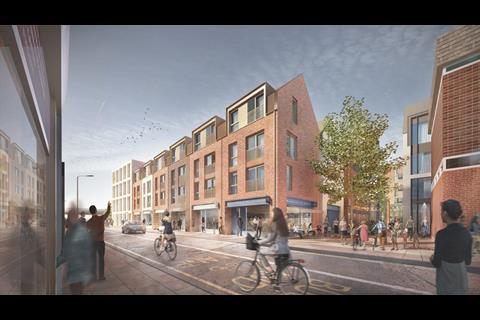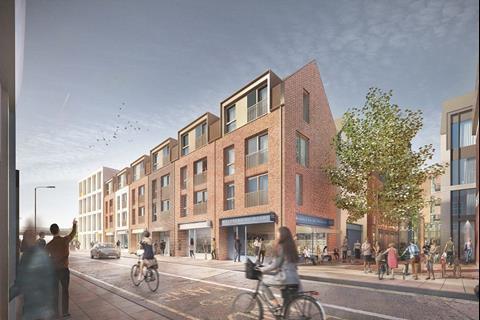Weston Homes says Conservatives have “no understanding” of the housebuilding industry
Weston Homes has blamed the Conservative government for its decision to cancel its Broadway Malyan-designed plans to redevelop a 1,100-home site in Norwich after eight years working on them.
National planning interventions, changes to nutrient neutrality rules and the impact of building safety reforms were identified by the Essex-based housebuilder as among the key causes for the Anglia Square scheme’s failure.
Bob Weston, chair and managing director of the firm, said he was “personally gutted” to write off millions of pounds of investment with nothing to show for it, and pointed the finger at central government.
“The core contributor to a lot of the issues in this saga is the Conservative government, which seems to have no understanding of the importance of supporting the housebuilding industry, regional cities and local communities in the UK,” he said.
In total, the housebuilder identified seven key issues which had led to delays, added costs and negatively impacted the 4.7ha scheme’s financial viability.
These include a national planning intervention by former housing minister Robert Jenrick who called in and overturned a 2018 local planning consent and then the planning inspector’s recommendation to approve.
After initially vowing to take the minister to court, Weston ultimately went back to the drawing board, where the progress was further impeded by the covid-19 pandemic, which hit the viability of the proposed 8,0000 sq m office and retail component of the scheme.
> Also read: Broadway Malyan downsizes controversial Norwich plans

In March 2022, further delays were caused when a nutrient neutrality directive from Natural England blocked the building of new homes across Norfolk intended to protect local wetlands and waterways.
One impact of the directive is that Weston would now have to pay a £4m levy to Norwich City Council to offset the increased nutrient levels that would be generated by Anglia Square.
From the start, Anglia Square’s viability had been “challenging”, according to Weston, which was why it had been allocated £15m of marginal viability funding from Homes England’s Housing Infrastructure Fund.
But the delays caused by planning, combined with Homes England funding rules, meant Weston would now only be able to draw down £7m from that.
While Homes England has offered a nine-month extension, the housebuilder said that would “only go part way to help the funding being spent in time”.
High build cost inflation, the loss of 100 homes due to changes stemming from design guidance in the Building Safety Act, and the £5.4m community infrastructure levy set to be charged on the final two phases of the development also impacted the viability of the scheme.
Despite gaining planning permission last April, the developer has decided to drop the scheme after a viability review.
According to Weston, these issues together have forced the business to write-off a £7.5m loss in its report and accounts due to the costs spent on design, redesign and consultation.
The business has yet to release its annual results for this year, but last year it recorded £18.2m pre-tax profit on £240m turnover.
“There are sadly no winners with this outcome. The city and people of Norwich, Weston Homes and Anglia Square are all victims of this deeply unfortunate situation,” Weston added, thanking the local council for its work to facilitate the development.
Broadway Malyan downsized the scheme in 2022, removing a much-criticised 20-storey tower and reducing floorspace by a third. Protestors had been fighting the scheme for several years, with the original 2018 planning application receiving 433 objections against just 63 comments in support.
Save Britain’s Heritage said in 2020 that Jenrick’s decision to reject the plans had provided “a huge opportunity for a more enlightened development”. The group’s executive president Marcus Binney said at the time that Jenrick had “repelled the vandals at the city gate”, adding: “Norwich has been spared the most monstrous carbuncle that ever threatened to deface an English cathedral city.”
The campaign group later commissioned Ash Sakula Architects to draw up alternative proposals for 773 homes in blocks no taller than four storeys.

























No comments yet